
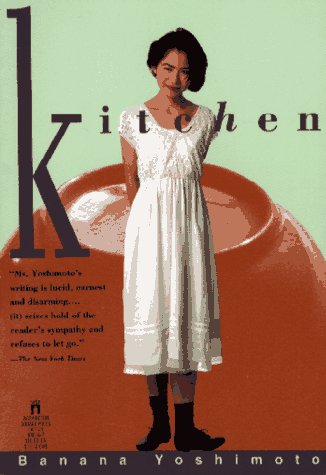 Inching one's way along a steep cliff in the dark: on reaching the highway, one breathes a sigh of relief. Just when one can't
take any more, one sees the moonlight. Beauty that seems to infuse itself into the heart: I know about that —from Kitchen
Inching one's way along a steep cliff in the dark: on reaching the highway, one breathes a sigh of relief. Just when one can't
take any more, one sees the moonlight. Beauty that seems to infuse itself into the heart: I know about that —from Kitchen
The author of a dozen novels and seven essay collections, Banana Yoshimoto dazzled readers in 1988 with her debut novel Kitchen. The short novel was an instant success in Japan and won several literary awards. It has been reprinted more than sixty times in Japan alone, and has been adapted for two films— one Japanese, the other Korean. Kitchen has been translated and published in more than twenty countries, as some of the book covers on this page testify to, and was translated into English by Megan Backus in 1993. Western media responses were largely positive with some reservations, but most agree that this contemporary novel captures perfectly what it means to be young in modern Japan.
Kitchen, as its American publisher explains, tells the story of one young woman and her adopted family. "Mikage, the heroine, is an orphan raised by her grandmother, who has passed away. Grieving, Mikage is taken in by her friend Yoichi and his mother (who is really his cross-dressing father) Eriko. As the three of them form an improvised family that soon weathers its own tragic losses, Yoshimoto spins a lovely, evocative tale with the kitchen and the comforts of home at its heart."
Please join three Belletrista readers in their discussion of this intriguing book.
Participating:
Laura, an IT Director from Pennsylvania, USA
Charlotte, a charity fundraiser in London, UK
Christina, a teacher from Ontario, Canada

Laura: The blurb on the back cover calls Yoshimoto's Kitchen "her best-loved book … an enchantingly original and deeply affecting book about mothers, love, tragedy, and the power of the kitchen and home in the lives of a pair of free-spirited young women in contemporary Japan."
And then says: " 'Kitchen' and its companion story, 'Moonlight Shadow,' are elegant tales whose seeming simplicity is the ruse of a writer whose voice echoes in the mind and the soul." Do you agree with this description of the book? Did Yoshimoto's voice touch your mind and soul?
Char: At the moment, I don't know if Kitchen and Yoshimoto's voice touched my mind and soul. I found the stories to be quite odd. 'Kitchen' is a strange mix of banal writing, absurdities and deep emotion that I haven't grasped yet. The banality comes from sentences like: "Dingdong. Suddenly the doorbell rang."
Yoshimoto (and/or her translator) uses commonplace phrases to describe a somewhat unbelievable situation in which a woman agrees to live with a young man she hardly knows and his mother (who happens to have previously been a man) who dies a shocking, violent death. But contained within all of this is a deep and paralysing grief that the three characters all experience.
Hmmm. Perhaps what I'm saying is that it did touch my mind, because since finishing the book I've been trying to figure out if it has touched my soul!
Christina: It very much touched mine. The notion that the widowed Eriko is so heartbroken by the loss of his wife that he takes on the female gender was, at first, very hard to swallow, but such a unique and profound way of dealing with pain that I couldn't really dismiss it. What a truly exceptional family dynamic. What I loved about it, too, was the simplicity and precision of the writing. Yoshimoto's descriptions of Mikage's lonely night really resonated with me. The fact that this was written in the '80s is really refreshing, because you don't see enough of transgender issues in North American literature these days. In this way, it's a real trailblazer.
Char: I agree that the transgender elements of both 'Kitchen' and 'Moonlight Shadow' are fascinating, particularly given the stories were written more than two decades ago. I liked that there is no baggage. The men become women, permanently or temporarily, and it seems that people are okay with that. I know nothing about Japanese mythologies or folktales but wondered if there are elements of transgendered stories in that culture that Yoshimoto is drawing upon.
Laura: I regret to say this book did not touch me at all. I was bewildered by it. I wondered if translation was part of the reason. I understood the grief characters felt after losing loved ones, but the language felt flat and neutral.
Char: I also felt unmoved on the first reading of 'Kitchen' particularly, but I started re-reading it this morning and had forgotten that there are some moving scenes. When she's on the bus, for example, and suddenly has tears cascading down her cheeks. But I think that these moments get lost in the mainly stilted prose. Like you, Laura, I wondered if this is a translation issue or whether Yoshimoto deliberately chose that style. Do other Japanese authors write in a similar way? I haven't read enough books from that part of the world to recognise a specific approach. Why do books often raise more questions than they answer??!
Christina: I haven't read enough Japanese literature in translation to appreciate whether or not the simplicity of the language is a true characteristic of the culture and its writing, or if it is just a poor translation. I only stopped to think about this when comparing perhaps Laura Esquivel's Like Water for Chocolate, which is also centered around a love of the kitchen and female power. Esquivel uses magic realism frequently in the text, which is characteristic of Latin American writing. So … I am curious to delve deeper into the literary elements that define Japanese writing before I discount Yoshimoto's style.
Char: I've been thinking all day about the role of food in the stories. It is so closely tied to comfort, familiarity, love and sympathy. That's really something I identify with! I guess it's a universal method of expressing love and care.
Laura: In 'Kitchen,' I knew the kitchen itself, and food, were supposed to be important, but it felt contrived. Mikage frequently mentioned how important the kitchen was to her, and how food and cooking were her passion and profession, but I didn't see how these became so important to her. The prose didn't convey the sensuality and power of food and cooking. I felt a stronger emotional pull in 'Moonlight Shadow'. The grief was more palpable and the scene at the bridge more powerful.
Char: A cursory glance at the Internet (i.e. Wikipedia) suggests that while she has many fans, Yoshimoto hasn't enjoyed critical acclaim. The article suggests that her work is considered to be 'superficial'. I think that's a tad harsh.
Laura: I agree that's harsh. I just read this interview which says: "Yoshimoto's characters deal with youthful troubles and urban existentialism—two themes that have been beaten many times but never seem to die. Yet unlike Bret Easton Ellis, and all the other urban writers with their detached, bird's-eye perspectives, Yoshimoto writes gritty stories with warmth and dogged innocence."
I can see the "dogged innocence" in 'Kitchen', and Yoshimoto is definitely not detached. She's right in there with her characters. It also helps me appreciate this book more if I think about it as existentialist literature. I am by no means an expert on existentialism beyond what I've gleaned from the Internet, but it gives me a new angle on the book, thinking about how it addresses human existence, human choice, and the meaning of life.
Char: I think it's interesting that Yoshimoto had two men react to the death of a beloved in the same way. Why did she choose to do this? Is she saying that men are incapable of dealing with grief, unless they can embrace their femaleness?
Laura: That's an interesting take on Eriko's reasons for becoming a woman. I thought his change was just in recognition of his own gender identity. The stories of transgendered people often involve feeling out of place in their original gender, and "knowing" they are really meant to be the opposite gender. I thought this was the case with Eriko.
This doesn't diminish his/her love for his/her wife in any way—I think that was very real. I just thought that after she died, Eriko acknowledged something inside and decided to become a woman. You picked up on something quite different, which went right over my head. I agree it's a pretty dramatic action to take in response to heartbreak, but it does make the action all the more profound.
Christina: It seems I may have to re-read that bit. Perhaps I misread the meaning of it. To adopt the gender of a lost loved one as a coping mechanism is, well, unsettling, on a second read. But then again, so is mass consumption of goods. Not only can we use an existentialist lens, but certainly a psychoanalytic one, as well. I guess it all boils down to finding emotional nourishment amidst tragedy.
Did anyone find the buying of small appliances a pleasant contrast to the sadness? It may be a bit stereotypical, perhaps, but I found the randomness of it quite amusing. Perhaps it is in contemporary wo/man's nature to buy stuff to fill the void, so to speak?
Char: I wonder if the retail therapy notion was a comment on Japanese society in the 1980s. The economy was incredibly strong then, and Japan was a world leader in the production of consumer and electronic goods, like photocopiers and juicers!
Ladies, it's been a fun and enlightening chat. Some insights, which would have never surfaced otherwise, were brought to the
fore in talking about the book. Thank you.
If you'd like to participate in one of our future conversations, send us a note at editor [at] belletrista.com.
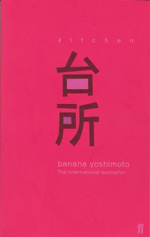

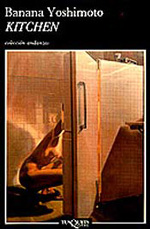
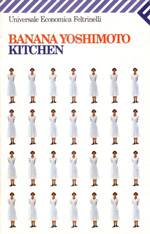
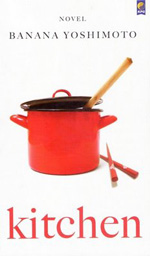
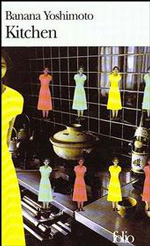

Banana Yoshimoto's latest book, The Lake, translated by Michael Emmerich, will be published in May by Melville House.

